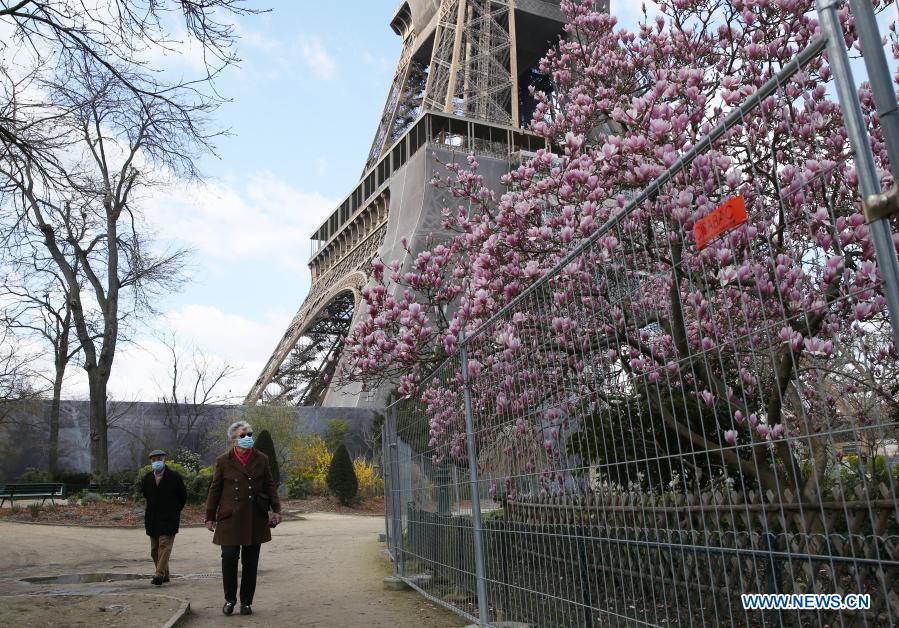
People wearing face masks walk in the Champ de Mars in Paris, France, on March 19, 2021. French Prime Minister Jean Castex on Thursday announced "new massive measures" to curb COVID-19 in the country's 16 worst-hit regions, including Paris. Starting Friday midnight, about 18 million French people in regions such as Paris, Hauts-de-France in the north as well as the Alpes-Maritimes on the Mediterranean should stay at home, Castex announced at a press briefing on the epidemic situation. (Xinhua/Gao Jing)
PARIS, March 18 (Xinhua) -- French Prime Minister Jean Castex on Thursday announced "new massive measures" to curb COVID-19 in the country's 16 worst-hit regions, including Paris.
Starting Friday midnight, about 18 million French people in regions such as Paris, Hauts-de-France in the north as well as the Alpes-Maritimes on the Mediterranean should stay at home, Castex announced at a press briefing on the epidemic situation.
The only authorized out-of-home trips will be to go to work when it cannot be done remotely, for a medical emergency, to provide assistance, to go shopping, or for outdoor exercise within a 10-km radius from home.
Schools will remain open. Non-essential shops will have to shut down, and inter-regional travel will be banned.
Meanwhile, the nationwide curfew will be relaxed across the country and will end at 7:00 p.m., rather than at 6:00 p.m., given the longer days, the prime minister said.
"The moment has come to go further, with more demanding restrictions where the situations are most critical," said Castex. "These measures that we are taking today in the most affected regions can be extended, if necessary, to other parts of the territory."
"The epidemic is accelerating," he said, adding that the virus resurgence "looks more and more like a third wave" due to the alarming spread of the "more virulent and potentially more serious" variant first detected in Britain, which now accounts for 75 percent of the country's new positive cases.
France has been placed under a nationwide curfew since mid-December. Some regions in the north and southeast of the country have already been under weekend lockdown to put a brake on the viral circulation.
Also on Thursday, France reported 34,998 new COVID-19 infections in the past 24 hours, the second highest daily count since last November after Wednesday's 38,501. The cumulative number of cases reached 4,181,607, while the death toll rose by 268 to 91,679.
Hospital admissions increased by 75 to 25,389, while the number of those in intensive care units totaled 4,246, an increase of 27 from Wednesday.
"We are facing a third wave. But the big difference with the previous ones is that we now have a perspective: vaccination," Castex told reporters.
So far, a total of 5,748,698 people have received at least one dose of the vaccine, and 2,393,568 got the two jabs.
Castex said the AstraZeneca rollout would resume on Friday and he would receive the vaccine "to show that we can have complete confidence."
"The AstraZeneca COVID-19 vaccine is effective, as underlined by the European regulator," he said, in reference to an earlier statement made by the European Medicines Agency (EMA).
France was one of many European countries that had suspended the rollout of the Oxford/AstraZeneca vaccine earlier this week, citing concerns over reports of people developing blood clots after the jab.
As the world is struggling to contain the pandemic, vaccination is underway in an increasing number of countries with the already-authorized coronavirus vaccines.
Meanwhile, 264 candidate vaccines are still being developed worldwide -- 82 of them in clinical trials -- in countries including Germany, China, Russia, Britain, and the United States, according to information released by the World Health Organization on March 16.